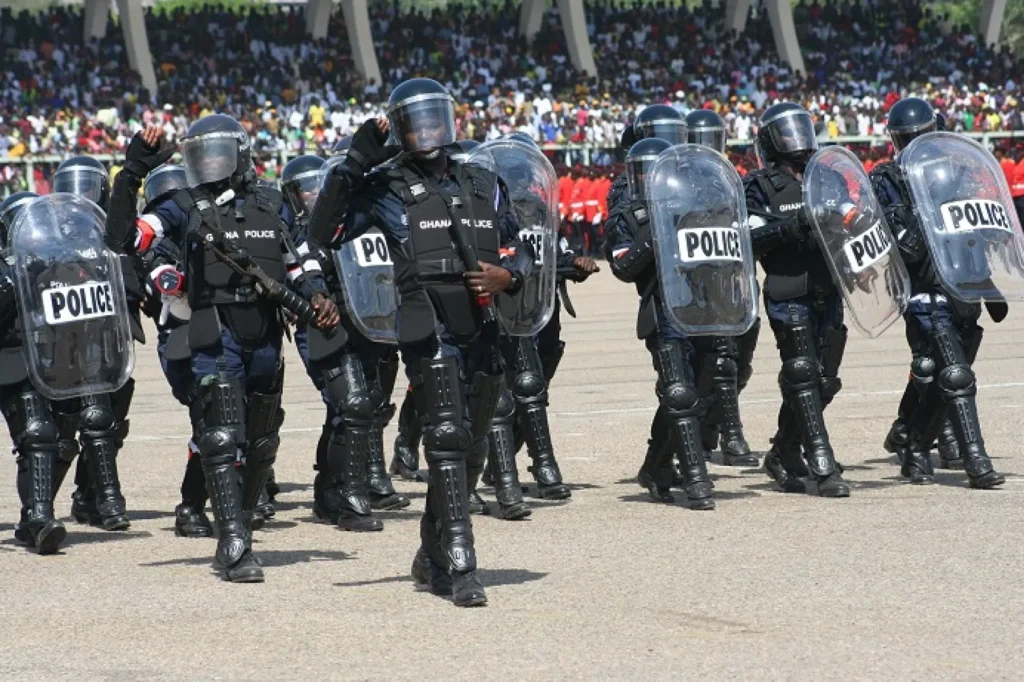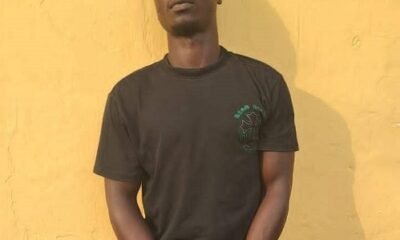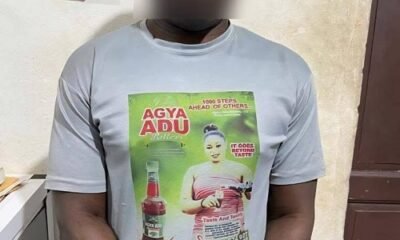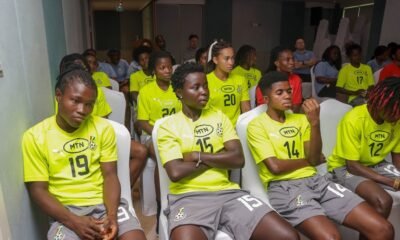Features
The Cop, press and lost fingers

The job of a policeman, whether he is short or tall, is not a cheap one. He is supposed to keep the peace, protect society and monitor the activities of local magicians and money doublers who are specialists in making civil servants lose their pay within seconds.
By far the most difficult job of the policeman is when he is expected to arrest a murderer who is not only armed but also has a record of appearing and disappearing at will. Even if the tough cop is in the company of other policemen all armed to the teeth, his stomach will turn to water when the criminal suddenly appears.
He is terrified not because the criminal is a better marksman, but because nobody dies twice. The problem also is that a criminal might be prepared to die in a bid to shoot his way to freedom. But is the police-man prepared to risk death in the course of duty when he has a family to rear.
If he had just acquired a new girlfriend with whom he is enjoying life, should he not run away with his tail between his legs and tell his boss that the criminal is uncatchable?
Before some policemen go on patrol duties, they actually pray solemnly. “God send me into the wilderness and bring me back safely with my nose intact because I’m worth more than a common rat. I also do not want to die like a stray dog. If a bullet is targeted at my forehead, Holy Spirit please let it go over the bar, because six children is not a small palaver. If I die, who will look after them? Lord keep me safe day by day. Amen!”
The Sikaman policeman’s job is a risky one because he is not properly equipped with even a trained dog to help track down criminals easily. So he has to use his own nose judiciously in sniffing out suspects while making sure a bullet doesn’t catch him square on the jaw.
My friend Sir Kofi Owuo, a.k.a. Death-By-Poverty was telling me journalists are in an even riskier profession. Apparently, he had been reading about the palaver of journalists in places like Algeria and Columbia. Algeria, even women journalists are not spared assassin’s bullet. You’d see them lying in front of their homes with their heads full of bullet holes.
In Columbia, no journalist is safe. When a journalist is leaving home, he has to tell his wife. “Darling, when I don’t come back by 7 p.m. check the mortuary
The drug trade in Columbia has made journalism a profession not worth practising. If you write on cocaine and the harm it is inflicting on society, you’ll certainly receive a phone call.
“Hello, Mr Journalist, your article yesterday was great. Congratulations! We never knew you were such brilliant writer, championing the cause of society. Again we say congrats! But you know something, by your article, you want to take the bread out of my and that of my family. You don’t want us to beak. We are aggrieved beyond measure”
“Oh, I was just… “You’d try to say something
“You don’t have to explain. The harm has already been done by your award-winning masterpiece. We have an appointment with you. You’ll hear from us.
Rest In Peace!” After such a phone call, you just have to pray to your soul, sing a hymn or two and get prepared fort appointment with death. For, death will surely come
I think pressmen in Sikaman would also have start informing their families appropriately before leaving for work now. “If I don’t come back early, I’m probably at the Ear, Nose and Throat Department of Korle- Bu checking a leakage in my left ear due to a gendarme slap from an AMA official. If you don’t see me there, track me down to the emergency ward. If you see a newly-made cripple, I’m the one”
What about referees? These days they are guarded during football matches so that the risk they bear in terms of lost teeth is minimal. Formerly, it used to be a job full of woes and tribulations.
You were expected to oversee a match in such way that would favour a particular team. If that is not done, you’ll get back home and your wife will not recognise you. She’ll mistake you for Frank Bruno who had just lost a bout. When she finally recognises you, she’ll fix some hot water to massage your poor face.
I hear that these days, apart from the protection referees receive, some are well-armed with Damfo Dzai, a kind of jack-knife that can carve a rowdy supporters face in several designs.
My Press Secretary and part-time bodyguard Devine Ankamah, was telling me if he happens to be a referee, he’d surely carry a Kalashnikov AK 47 rifle with him, complete with loaded magazine, before officiating matches. According to him, that is the only way to do the job without fear or favour. Anyone dares will lose his jaw.
Anyway, risky jobs require good remuneration. As Kwame Korkorti once said, risky jobs require risky salary. A policeman would require a good pay so that when a criminal targets his left ear it would be worth the ‘amputation’. Same for journalists and cameramen.
But go round private workplaces and factories and you’d see really risky occupations where workers are receiving salaries they can’t see with the naked eye.
In fact, in some private workplaces, environmental safety is completely absent. Workers breathe in fumes, poisonous gases and risk lung and respiratory problems. Their employers do nothing about protecting them against these hazards. Check out their payer.
In other places, workers have their fingers chopped off on the job, some losing as many as four fingers in stretch. The compensation they get can best be described as “wicked”. Their employers live big, chop big, ride big but are not willing to pay more than ¢120,000 for lost fingers.
Actually the more fingers you lose, the more money you get. So if you intend losing your fingers on the job, it is advisable to lose as many as possible so that you can get more cash. Those who have lost one finger have not benefited much and are encouraged to lose more next time around.
Sikaman Palava is undertaking to investigate some of these cases of very risky jobs in private setups and companies where workers are being exploited to unnecessarily but not offered protection against health hazards, and not properly compensated when they sustain injuries.
This article was first published on Saturday, September 28, 1996
Features
When the calls stop coming
THE state of feeling rejected, could be a terrifying experience especially for those who have become used to fame. If not properly addressed, it could lead to depression and the consequences, could be disastrous.
When you are on top of your game in whatever profession you find yourself such that you become famous, a lot of people try to associate with you. The phone never ceases to ring and one is tempted to feel loved and very important.
When a disaster strikes and the fame or the money which was the source of the attraction fades away, the circle of friends and fans begin to shrink and the phone will start to stop ringing until the call stops voting completely.
You will be shocked at how people you considered friends, will no longer be calling you or pay casual visits as they used to. You will begin to notice that messages you leave after calling them and not getting a response are not replied to and that is when you begin to know who your true friends are.
One of the most popular movie stars was an actress called Sharon Stone. In an interview with one of the media houses that was published, she spoke about how people who should have come around to encourage her in her moment of depression, shunned her. The calls stopped coming.
This is what the Bible admonishes that the arm of flesh will fail you and therefore we should put our trust in God. It could be a very frightening experience and can easily lead to depression.
Human nature being what it is, people will want to get close if things are okay. Everybody wants to associate themselves with interesting things, famous people, rich people etc for mainly selfish reasons.
We need to develop the habit of putting our trust in God and relying less on human beings. The lesson we have to take along in life is that, no one marries his or her enemy so how come people who took vows that they will love each other become so hostile to each other that they want to go their separate ways in life? Such is the reality of life.
It is therefore prudent for people to recognise that, life is full of uncertainties and so there is the need to prepare your mind for uncertainties so that when they occur, they do not disorganise your mental sanity.
A lot of people have experienced situations where people who they could have sworn will never betray their trust have disappointed them when they were through challenging moments.
If there is one thing famous people should desire, it should be the ability to identify who are true friends are. Countless stories abound regarding incidence of celebrities who have lost their shine and their wives divorcing them soon after.
It is sometimes useful as a famous or rich person to sign a prenuptial agreement before marriage to safeguard or protect yourself from any future unpleasant surprises.
People can be very pretentious these days, it goes both ways. There is this real life story where a man married a divorced wealthy woman and convinced her to sell her house so they could build a new one together, with the excuse that people are gossiping that he is being housed by a woman.
The woman agreed and they put up a new building. After a few years the man asked for a divorce, only for the woman to realise that the land on which the building was situated, was bought in the man’s name.
This can drive a person insane, if you are not mentally tough and this happens to you. When people hear that you are homeless, a lot of your so-called friends will stop calling, so that you do not become a burden on them.
By Laud Kissi-Mensah
Join our WhatsApp Channel now!
https://whatsapp.com/channel/0029VbBElzjInlqHhl1aTU27

Features
Borla man —Part Two
‘But, er …. I don’t even know your name’.
‘Paul. Paul Allotey. I’m Sarah, by the way. Paul, why don’t you leave me here, since this is the last important thing I’m doing today’.
‘Okay. Now Sarah. I was just thinking. You will be here at the cafe for about an hour. By then it will be about twelve thirty. Then, you would be thinking of buying yourself some lunch, to eat here or to take home. So if you would please allow me, I will take you to one of the nicest eating places in town, and after you have sorted that one out, then I can drop you home. Just that one errand, then I won’t bother you again’.
‘You are not bothering me at all. You are being very kind to me. And I just realised you are a mind reader too. The last item on my agenda was lunch’.
‘I’m so glad I appeared at your doorstep, just in time’.
‘Okay. Now Paul, since you say the cafe is a comfortable place, let’s go in together, and you can do your work while I get my application done’.
‘Okay, Sarah. Thanks. Let’s go’.
We got back in the car at eleven forty-five.
‘So where are we going, Paul?’
‘To Royalty restaurant. It’s a twenty minute drive away’.
‘So, do you enjoy your job?’
‘Most certainly. I won’t change it, not even to be President. And am I right to say that you are preparing to enter the university?’
‘That’s my plan. I hope it works’.
‘It will, if you are determined, and disciplined. You look very much like a disciplined person’.
‘Thank you very much’.
We arrived at Royalty in twenty-five minutes, ‘You are joining me for lunch, Paul’.
‘Thanks for the honour, Sarah. But the bill is on me’.
‘Aren’t you taking on too much for one day?’
‘I never do anything that is bigger than me, Sarah’.
Over the next hour and a half, we discussed fashion, local and international politics, and sports, as we ate and relaxed. Finally, he drove me to the shop.
‘I will never forget you, Paul’.
‘I’m glad to have been helpful. But if you don’t mind, I’ll say it again, your husband is extremely lucky. You are really beautiful’.
‘Thanks again. But do you mind if I call you sometime in the future?’
‘Certainly not. Let me write it here. I will not ask for your number, for obvious reasons. But I will be looking forward to hearing from you. And hopefully, I will see you next month, when I call to drop your bill’.
‘Okay Paul. See you then’. What a lovely day, I said to myself as I opened the front door. I closed the shop and got home by seven. I went straight to the bedroom, stood in the mirror and took a good look at myself. ‘You are a very beautiful woman, Sarah. Never forget that’. I will not forget that, again.
Over the next several weeks, Martin and I had very little to do with each other. In the morning he ate his breakfast and after a shabby ‘I’m going’, he left. He came home around eight at the earliest, ate his dinner and, already soaked in beer, went off to sleep.
He spent the greater part of the weekends at the club house with his friends, playing tennis and partying. My mind was focused on furthering my education, so I didn’t complain to him, and didn’t bother to inform my parents about what was happening. I had decided that I would only take action if he lifted his hand against me again. I spent my free time reading all manner of interesting stuff on the internet, and chatting with my sister on WhatsApp.
One evening, he came home at about eight, rushed to the bedroom and rushed out. An envelope, obviously containing money, dropped out of his pocket, and I picked it up and followed him. I was going to call him and give it to him, but I noticed that there was a young woman in the car, so I went back in, counted it and put it in a drawer in the hall. He came back after some ten minutes.
‘Excuse me, I dropped an envelope containing money. You must have seen it’.
‘Yes, I saw it. Actually, I followed you, and was about to call you and hand it over to you when I realised that there was a woman in the car, so I came back in. I counted it. One thousand cedis.
‘Well let me have it. I have to be going’.
‘I will let you have it if you will tell me who the woman in the car is, and why you are going to give her that amount of money’.
‘Listen, if you waste my time, I will teach you a lesson you will never forget. Give me the money now!’
‘Here’s what we will do, Martin. I know you will give money to her anyway, so I will give it to you, if you will withdraw the threat you just issued. But I want you to know that I will be taking some steps from tomorrow. Things are getting out of hand’.
‘Okay, I’m sorry I threatened you. Can you please give me the money’. I handed it over to him, and he ran out’.
The following morning, I waited for him to finish having breakfast, and told him I wanted to have a word with him urgently.
‘You better be quick. You know I’m going to work’.
‘Well, I want to inform you that I will inform my parents, and your parents, about the situation in this house. As I said yesterday, things are getting out of hand. You spend most of your time drinking. You get drunk every evening, and through the weekend. And you are also spending your time and money on a prostitute’.
‘How dare you? One more stupid word from you …’
‘Am I lying, Martin? You have just started life, yet you are behaving like a rich, elderly man who has already seen his children through university, and can afford a life of fun. As I said, I’m going to inform our parents. Maybe your parents can straighten you out before it is too late’.
‘Look, we can talk this evening. It’s nothing like what you are saying’. He walked away, shocked.
That evening, I was expecting to have a meaningful discussion with him, but his mother called early in the evening to offer me some ‘advice’. Her son had called to say that certain developments at home were disturbing him so much that they were beginning to affect his work.
And, ‘as a loving mother to her daughter’, she was advising me to submit to my husband, and support him in prayer, and not ‘drive him from home’. Men would always be men, and she was telling me ‘from experience’ that no matter how much time Martin stayed away from home, he would always come home to me.
She had been a young wife before, so she understood the challenges I was facing. So I could be assured that if I followed her advice, all would be well. And, of course, she didn’t allow me to tell my side of the story.
Martin came home very late, and very drunk. And from the next morning, he carried on as before. With some hesitation, I called my dad and told him all that had gone on.
‘Well, my daughter. I’m not going to say “I told you so”. I was only trying to protect you. So here’s what we’ll do. Continue doing the best you can, and try not to give him any excuse to harm you, but if things continue to deteriorate, I will take you back.
A couple of days later, my cousin Dinah arrived in Accra from Brussels, having completed her medical course. With Martin’s agreement, I went to Koforidua and spent a couple of days. I spent most of the time chatting about her experiences in the US, but we also discussed my relationship with Martin, and she endorsed Dad’s decision to take action if Martin’s behaviour did not change after two weeks Elaine informed Mom and Dad. We endorsed Dad’s decision to take action if there was no change in two weeks.
Dinah returned with me to Takoradi. Her plan was to spend a couple of weeks, and return to Accra to be posted. I called Paul Allotey, and asked if he would meet her for lunch and, if possible, show her some interesting spots. Delighted, he suggested that we meet at Royalty the next day.
I told Martin about it, to remove any possibility of future disagreement over ‘going out with men’.
‘It’s fine with me’, he said, ‘if, of all the people who could show your sister round this town, you chose a borla man. Doesn’t that indicate the kind of person you are?’
‘ First of all, Martin’, I’ve spoken to him a few times, and he comes across as a decent guy, so I think it is rather unfortunate that you are writing him off when you don’t know him’.
By Ekow de Heer
Join our WhatsApp Channel now!
https://whatsapp.com/channel/0029VbBElzjInlqHhl1aTU27















